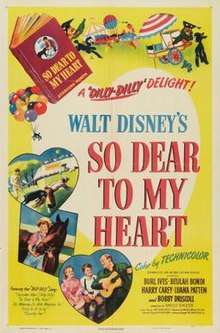So Dear to My Heart
So Dear to My Heart is a 1948 American live-action animated feature film produced by Walt Disney, released by RKO Radio Pictures. Its world premiere was in Chicago, Illinois on November 29, 1948. Like 1946's Song of the South, the film combines animation and live action. It is based on the 1943 Sterling North book Midnight and Jeremiah. The book was revised by North to parallel the film's storyline amendments and then re-issued under the same title as the film.
| So Dear to My Heart | |
|---|---|
 Theatrical release poster | |
| Directed by | Harold D. Schuster Hamilton Luske |
| Produced by | Walt Disney Perce Pearce |
| Written by | Ken Anderson John Tucker Battle Marc Davis Bill Peet Maurice Rapf Ted Sears |
| Based on | Midnight and Jeremiah by Sterling North |
| Starring | Bobby Driscoll Luana Patten Beulah Bondi Burl Ives |
| Music by | Paul Smith |
| Cinematography | Winton C. Hoch |
| Edited by | Lloyd L. Richardson Thomas Scott |
Production company | |
| Distributed by | RKO Radio Pictures, Inc. |
Release date | November 29, 1948 (Chicago, Illinois) January 19, 1949 (Indianapolis, Indiana)[1] |
Running time | 82 minutes |
| Country | United States |
| Language | English |
| Budget | $1.5 million [2] |
| Box office | $3.7 million (U.S. rental) $575,000 (foreign rental) [3][4] |
So Dear to My Heart was the final film appearance of Harry Carey.
Plot
Set in Indiana in 1903, the film tells the tale of Jeremiah Kincaid (Bobby Driscoll) and his determination to raise a black-wool lamb that was once rejected by its mother. Jeremiah names the lamb Danny for the famed race horse Dan Patch (who is also portrayed in the film). Jeremiah's dream of showing Danny at the Pike County Fair must overcome the obstinate objections of his loving yet tough grandmother Granny (Beulah Bondi). Jeremiah's confidant Uncle Hiram (Burl Ives) is the boy's steady ally. Inspired by the animated figures and stories, the boy perseveres.[5]
Cast
- Bobby Driscoll as Jeremiah "Jerry" Kincaid
- Luana Patten as Tildy
- Burl Ives as Uncle Hiram Douglas
- Beulah Bondi as Granny Kincaid
- Harry Carey as Head Judge at County Fair
- Raymond Bond as Pete Grundy, Storekeeper
- Walter Soderling as Grampa Meeker
- Matt Willis as Mr. Burns, Horse Trainer
- Spelman B. Collins as Judge
- Bob Haymes as Singer Bob Haymes
Voices
- John Beal as Adult Jeremiah/Narrator
- Ken Carson as The Owl
- Bob Stanton as Danny
- Marion Darlington as Whistling Sound Effects
- Clarence Nash as Vocal Sound Effects
- The Rhythmaires as Vocal Ensemble/Bluebirds
Awards and honors
The film was nominated for the Academy Award for Best Original Song for Burl Ives's version of the 17th-century English folk song "Lavender Blue," but lost to "Baby, It's Cold Outside" from Neptune's Daughter.
Bobby Driscoll received a special Juvenile Award from the Academy, honoring him as "the outstanding juvenile actor of 1949".[6] (In addition to So Dear to My Heart, he had garnered critical acclaim for his dramatic performance in the RKO melodrama The Window.)
The film is recognized by American Film Institute in this list:
- 2004: AFI's 100 Years...100 Songs:
- "Lavender Blue" – Nominated[7]
Production
The train depot in the film was later relocated to Ward Kimball's Grizzly Flats Railroad in his backyard. After the railroad closed, John Lasseter relocated it to his property.
Release
The film returned rentals to RKO by 1951 of $2,775,000 with $2,200,000 being generated in the U.S. and Canada.[3]
The film was re-released in 1964 and earned an estimated $1.5 million in rentals in the U.S. and Canada.[4]
So Dear to My Heart was released on home video in 1986. It was then re-released in 1992 and released on video in 1994 as part of the Walt Disney Masterpiece Collection. The film was originally planned for a US DVD release as part of the Walt Disney Gold Classic Collection, but was cancelled, with no particular reason given. Six years after seeing a region 2 DVD release, it was released in the US on DVD in July 2008 as a Disney Movie Club Exclusive.
See also
References
- "Disney Premiere Here to Be Hollywood Style". The Indianapolis News. January 7, 1949. p. 21. Retrieved August 14, 2019 – via Newspapers.com.
- "109-Million Investment by H'Wood in Current Technicolor Features". Variety. February 18, 1948. p. 7.
- "Richard B. Jewell's RKO film grosses, 1929–51: The C. J. Trevlin Ledger: A comment". Historical Journal of Film, Radio and Television, Volume 14, Issue 1, 1994. Domestic earnings $2.2 million; Foreign earnings $575,000.
- "Big Rental Pictures of 1964", Variety, January 6, 1965 p 39. 1964 revenue anticipation - $1.5 million
- Lockhart, Jane. "Looking at Movies: So Dear to My Heart". The Rotarian. February 1949, p.36.
- "22nd Academy Awards". Oscars.org. Archived from the original on July 6, 2011. Retrieved July 6, 2011.
- "AFI's 100 Years...100 Songs Nominees" (PDF). Retrieved August 5, 2016.